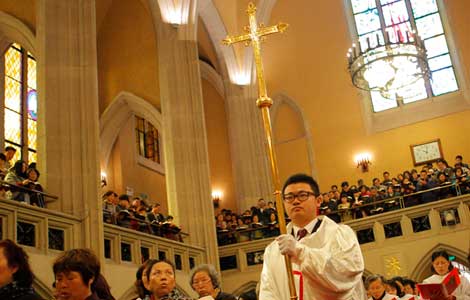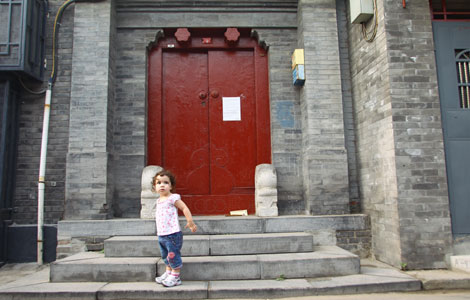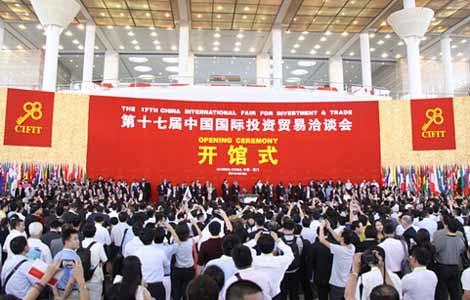Former railways official pleads guilty
Updated: 2013-09-11 02:01
By CAO YIN (China Daily)
|
||||||||
Zhang says he longed for fame and wealth; lawyers ask for leniency
A former high-ranking official in China's high-speed railway system pleaded guilty to charges of accepting 47.55 million yuan ($7.77 million) in bribes.
Zhang Shuguang, former director of the transport bureau under the then-ministry of railways — now China Railway Corp — stood trial at Beijing No 2 Intermediate People's Court on Tuesday. The sentence was not announced after the trial.
Zhang's trial follows the one last week of Su Shunhu, former deputy chief of the bureau, who was charged with accepting 24 million yuan in bribes. Su also pleaded guilty, but his lawyer, Zheng Fucheng, questioned the prosecutor's sum of bribes at the trial. Su's sentence also has not been announced.
Zhang, 56, from Jiangsu province, was also the ministry's former deputy chief engineer and the right-hand man of Liu Zhijun, the former railways minister who was sentenced to death in early July with a two-year reprieve for accepting 64.6 million yuan in bribes and abuse of power.
Zhang was suspended from office in February 2011 and charged with bribery in December 2012.
Wearing a black jacket, the gray-haired Zhang was taken to the courtroom at 9:34 am. The trial lasted almost eight hours.
During the trial, prosecutors accused Zhang of accepting massive amounts of bribes from 13 companies while he worked for the bureau from 2000 to 2011.
The largest sum that Zhang took was 18.5 million yuan from Wang Jianxin, head of a company in Wuhan, Hubei province, after Zhang "helped" Wang improve railway-related technology in 2007 to 2009, according to prosecutors.
From 2005 to 2009, Zhang asked Ge Jianming, head of a company in Jiangsu, to offer him bribes of 8 million yuan in Zhang's pursuit of the title of academician at the Chinese Academy of Engineering, a title he did not get, the prosecutors said.
In the courtroom, Zhang confessed he had met Ge more than 20 years ago and required him to supply money.
In the prosecutors' accusation, Zhang also accepted bribes of more than 10.5 million yuan from Yang Jianyu, head of a company in Guangdong province, after Zhang assisted Yang with contract bids.
Yang provided bribes of china, watches and artworks to Zhang, the prosecutors said.
Yang also provided a job for Luo Fei, Zhang's mistress, giving her a 16,000 yuan monthly salary, a car and watches, or a total of 400,000 yuan, prosecutors said.
Many of the companies involved in bribing Zhang were private ones that hoped the transport bureau would use its devices and technology in the construction of high-speed railways, while some of the alleged bribery providers were Zhang's old friends, prosecutors said.
The defendant confirmed accepting bribes, but he told the court that he did not succeed in helping some of the companies "because such technology or equipment from them could not reach our standard, or might bring hazards to the high-speed railway network".
During the trial, Zhang showed guilt over taking bribes, saying he would like to be punished according to the law.
"I studied railways and devoted myself to this industry. At the beginning, as I became the director of the bureau, I was very discreet, but later, especially after I made some achievements, I became careless," he said in his final statement to the court.
"I was proud of being a railway staff member and happy to see the great development of the high-speed railway in our country," he said in a louder voice.
"I made the country's interests and railway construction my priority, but I longed for fame and wealth at the end," he added with a sigh.
Wang Daming and Yang Xiguang, lawyers for the defendant, said Zhang had a good attitude about pleading guilty and asked the court to give Zhang a lighter penalty.
Zhang Zhuting, a professor at the Ministry of Transport's Management College who has watched the series of railway cases, said the central government must pay attention to large transportation construction projects.
"It's the right time to establish an anti-graft system in transportation-related industries, not just the railways," he said.
"What we saw before the trial was that Zhang Shuguang mastered the high-speed railway technology and was the top engineer, but in fact, he was the one with great power who easily became corrupt," he said.
Yi Shenghua, a Beijing lawyer specializing in graft cases, agreed with Zhang but added that it is also important to punish those who offer bribes.
"After all, it's a two-way street, which means both bribery suppliers and receivers should be blamed," he said.

 China's Christian churches reduce leaders' age ceiling
China's Christian churches reduce leaders' age ceiling
 Student's rare blood bonds Kazakhstan and China
Student's rare blood bonds Kazakhstan and China
 Apple's low-end phone price disappointing
Apple's low-end phone price disappointing
 US marks 9/11 anniversary
US marks 9/11 anniversary
 German Bach elected as IOC president
German Bach elected as IOC president
 Implant surgery for boy's eyes a success
Implant surgery for boy's eyes a success
 Hutong life facing change
Hutong life facing change
 New York Fashion Week in session
New York Fashion Week in session
Most Viewed
Editor's Picks

|

|

|

|

|

|
Today's Top News
Report questions US firms pursuing cloud computing in China
Reducing poverty gains momentum in Asia
China turns to US sorghum for animal feed
Russia proposal likely to avert US airstrikes
Li stresses transformation of economy
FM dismisses Philippine accusations
China's global firms face 'trust gap'
Shanghai gets tips on innovation
US Weekly

|

|






